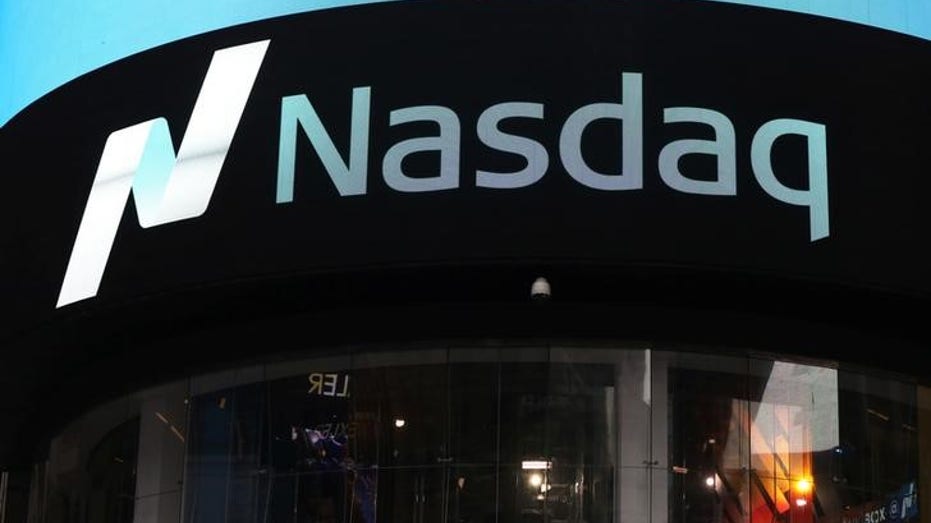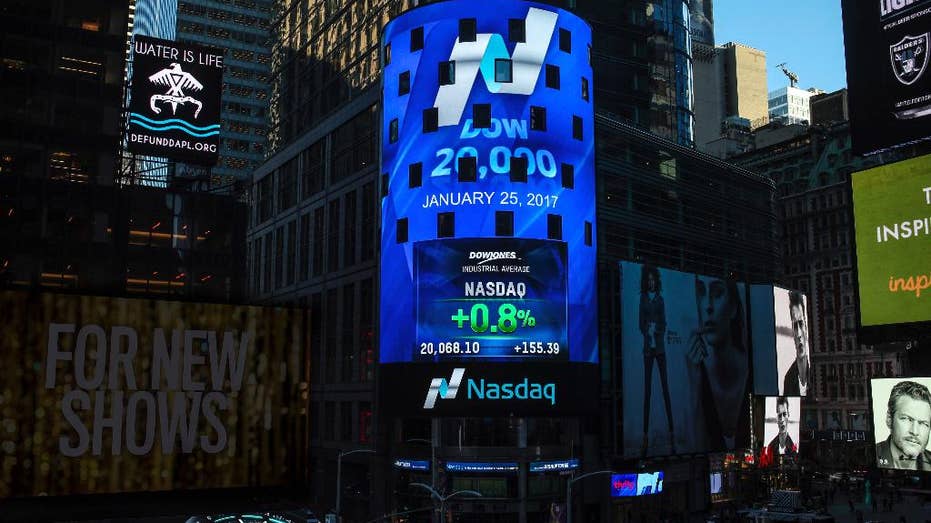Inflation surge whips up market froth
The Treasury inflation-protected securities fell to its lowest since 2003
Fox Business Flash top headlines for November 12
Check out what's clicking on FoxBusiness.com.
Enthusiasm for riskier corners of the market has sent stock indexes and cryptocurrencies to record highs. A powerful driver, investors say, is surging inflation and the effect it has suppressing returns on safe government bonds, a main alternative to stocks.
Last week so-called real yields, which take into account the corrosive effects of inflation, hit some of their lowest levels on record. One measure of real yields, 10-year Treasury inflation-protected securities, fell to minus 1.2%, according to Tradeweb. That is the lowest on record, according to data going back to February 2003.
In essence, with real yields negative, the purchasing power of money invested will decline over the lifetime of those bonds.

The exterior of the Nasdaq market site in Times Square in New York City on April 25, 2017. REUTERS/Shannon Stapleton
ELON MUSK SELLS MORE TESLA SHARES WORTH $687M
Real yields have fallen because of colliding factors. These include the highest inflation rate in over three decades combined with nominal bond yields that have risen only modestly as central banks hold back from raising rates.
The prospect of negative returns on super safe inflation-protected bonds has pushed investors to buy riskier assets.
"With real yields, the lower they are, the more it encourages speculation," said Lorenzo Di Mattia, chief investment officer of hedge fund Sibilla Capital. As cash loses value from inflation, investors are increasingly motivated to put their money to work, he said.
In one sign of froth, shares of electric-vehicle startup Rivian Automotive rose 29% when they started trading on Wednesday. They rose again Thursday and Friday, giving the firm a market value larger than that of a key shareholder, Ford Motor Co. , despite Rivian having only started to deliver vehicles in September.
STOCKS RALLY AS JOHNSON & JOHNSON PLANS SPLIT INTO 2 COMPANIES
Cryptocurrencies have surged. Bitcoin hit a record last Tuesday, trading at $68,525 on Tuesday, according to CoinDesk. While major stock indexes edged lower last week, they remain less than 2% off all-time highs.
Inflation has been a primary concern in markets in recent months, as investors and analysts seek to understand whether pandemic-induced supply chain snarls and labor shortages will prove short lived or not.
Developed-market central banks continue to assert that the surge will be transitory. Federal Reserve and European Central Bank officials pushed back against market expectations of interest rate increases in recent weeks. ECB President Christine Lagarde also said earlier this month that her institution is very unlikely to raise rates next year.
In Europe, the German real yield equivalent slid to minus 2.2%, close to its lowest level on record.

The display at Nasdaq Tower in New York's Times Square on Jan. 25, 2017. (Rohini Shahriar/Nasdaq via AP)
VETERANS DAY STOCK AND BOND MARKETS: WHAT'S OPEN
Shaniel Ramjee, a multiasset fund manager at Pictet Asset Management, has snapped up growth stocks such as green technology companies and taken more risk by adding shares of smaller-cap companies.
"The real yield being more negative incentivizes more risk taking," Mr. Ramjee said. As inflation is increasingly expected to eat into portfolios, investors pile into riskier investments with potentially higher returns to try to offset this, he said. "I do think it has been a driver of the recent move up in equities."
As real yields have fallen, technology stocks whose growth prospects are far in the future have benefited the most. The tech-heavy Nasdaq Composite Index has risen about 10% in the past month, roughly doubling the rise in the Dow Jones Industrial Average, which holds a greater weighting of old-line financial and industrial companies.
CLICK HERE TO READ MORE ON FOX BUSINESS
For cryptocurrencies, their performance in an environment with rising consumer prices is more unclear. Investors and analysts are split on whether their values are driven by how much risk investors are comfortable taking or if they also hedge against inflation. Their track record isn’t great: Bitcoin sold off earlier in the year amid an upswing in concerns about price increases.
"The lower-yield, risk-on environment has been favorable to crypto," said Joel Kruger, a currency strategist at LMAX Group, a currency and cryptocurrency exchange. But if inflation rises to the point where the Fed might need to increase rates, cutting credit off from the economy, this could hit risk-taking in general including crypto, he said.




















